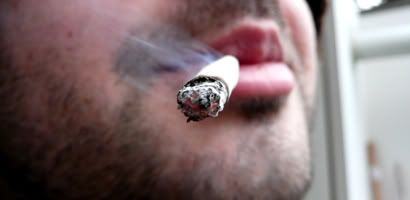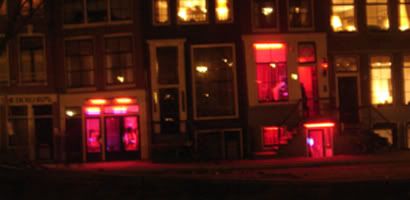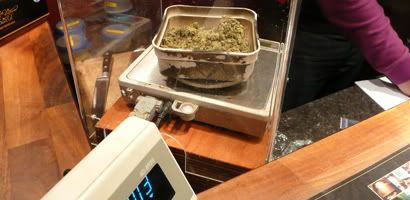 From JMAG
From JMAGThe idea of tolerance has been at the heart of the Dutch well before philosopher Baruch Spinoza preached about it in 17th century Amsterdam. Now in the 21st century, inquisitive travellers and pilgrims of vice seek out the old city's infamous Red Light District of De Wallen (The Walls), synonymous with legal weed and pot-smoking coffeeshops, shroom-tripping and prostitution to experience pragmatism in practice first hand. Whether they indulge or not, tourists can't deny the Dutch line of thinking has built a society that allows a few more freedoms than most other countries, while still maintaining the safety of its peoples.
However, concurrently Amsterdam and The Netherlands are going through periods of change and many fear the nation's unique characteristics are getting bent and stripped towards conservatism, with some brothels and coffeeshops forced to close and the magic mushroom trade outlawed entirely. "Tolerance and freedom do not imply indifference," says Bas Bruijn, press officer for the City of Amsterdam.
At a municipal level, Amsterdam mayor Job Cohen and City Hall believe over the last few years "an imbalance has evolved between the various activities" within the Red Light District. Says Bruijn "low-level economic activities and crime-sensitive sectors have become over-represented. The concentration has attracted criminal elements, and had an adverse effect on the city's living conditions and economic climate."
In response the municipality created Project 1012 in an effort to wipe out the crime and re-establish a balance in the neighbourhood to a mix of "shady and chic"; inviting for businesses, residents and tourists alike, with upmarket bars and boutiques, culture and cuisine alongside brothels and coffee shops.
"By reducing the number of coffee shops and prostitution windows the City takes a firmer control over the sector in order to put an end to unacceptable practices, such as money laundering and women-trafficking," says Bruijn.
The Project documents state "prostitution will be reduced and zoned to two well-organised areas. As such, half of the supply will continue to exist. Approximately 243 of the original 482 windows will remain. One quarter have already been sold to housing corporations over the last year."
 But won't the ladies start working the streets, where prostitution is illegal? "We will closely monitor the consequences of the current plans. A couple of years ago the City closed an extended prostitution area," say Bruijn. "At that time the same question came up. We managed to close this prostitution area without an increase in underground activities."
But won't the ladies start working the streets, where prostitution is illegal? "We will closely monitor the consequences of the current plans. A couple of years ago the City closed an extended prostitution area," say Bruijn. "At that time the same question came up. We managed to close this prostitution area without an increase in underground activities." Mariska Majoor, an ex-prostitute who runs the Prostitute Information Centre in the Red Light District for 15 years disagrees. She says the most recent closures did push a small group to the streets. "When it gets busier in the summertime we can see the effects better". So does she agree the district needs a clean up? "For a part. We see the problems on the street with drugs and girls with pimps behind some of the windows as well. But the government makes it sound worse than it really is. I think that they simply don’t like the Red Light District at all and they use trafficking as an excuse."
The other avenue to cut out the criminal stronghold on the Red Light District is a reduction of up to 50% of its coffee shops to leave 26 in total, that translates to a 17% reduction across all of Amsterdam.
To quote Pulp Fiction's Vincent Vega, "it's legal, but it ain't a hundred percent legal…It breaks down like this." The Dutch Government's drug policy guide cites the USA's Institute of Medicine findings that "there is no persuasive evidence that the pharmacological properties of cannabis can provoke the switch to hard drugs," and thus cannabis is only a 'gateway drug' via its sociological properties. So the aim of the coffeeshop according to the guide is to "keep cannabis separate from hard drugs in order to protect cannabis users from exposure to hard drugs and the criminal elements who traffic in them." Ironically, while the retail is legal, the backdoor wholesale of marijuana to coffeeshops is illegal and is run by organised crime, the same 'criminal elements' controlling the hard drugs.
 However, some within the government want to dam up the illegal revenue streams by flowing the weed via their own channels, much like their canals. During last year's 'cannabis summit', involving 33 Mayors from across the nation discussing issues of drug tourism and smuggling on border towns and the strong link to organised crime, Eindhoven mayor Rob de Gizjel told Dutch newspaper Volkskrant of the need to develop a government-sponsored grow-op.
However, some within the government want to dam up the illegal revenue streams by flowing the weed via their own channels, much like their canals. During last year's 'cannabis summit', involving 33 Mayors from across the nation discussing issues of drug tourism and smuggling on border towns and the strong link to organised crime, Eindhoven mayor Rob de Gizjel told Dutch newspaper Volkskrant of the need to develop a government-sponsored grow-op."Authorities must get a grip on the supply of drugs to coffeeshops. It's time that we experiment with a system of regulated plantations so we can have strict guidelines and controls on the quality and price." Mayor de Gizjel said.
It's not only municipalities that are eager to pass the Dutch laws. The federal government last year made news around the world by snuffing out tobacco-spun joints in coffeeshops, leaving smokers to toke only pure weed indoors or buy mixed pre-rolled joints to take-away. They also decided that "municipalities should develop and implement additional rules regarding the distance (250 meters) of coffeeshops to secondary schools," states Saskia Hommes, spokesperson for the ministry of Health, Welfare and Sport. The regulation would mean closure of another 43 coffee shops within Amsterdam by 2011.
And it's not only reefer madness for drug lovers. The most recent national law change saw the sale of magic mushrooms outlawed as of December 1, 2008. Known locally as 'paddos', magic mushies were available for sale at so called 'Smartshops' to customers 18 years and over, on the proviso that the fungi was accompanied by adequate information about use and abuse of the drug, what not to take in conjunction with the shrooms (alcohol), and how to have a safe and enjoyable high. From the government's point of view it kept that buffer between hard drug dealer and user. However, Hommes says that the message wasn't getting to some users.
"Looking at recent incidents concerning the misuse of mushrooms by certain individuals, the Dutch Minister of Health felt he had to ban the sale of mushrooms because the control and information were not preventing foresaid incidents." One such high profile incident was the 2007 death of a French tourist who jumped from a prominent building rooftop while tripping on shrooms, falling to the traffic below. The 17-year-old's parents blamed the Dutch state even though the sale was to her of-age friend and not to the minor herself.
The stores do sell weaker highs like Ayahuasca, similar to a low dose of psilocybin – the alkaloid in shrooms that makes one trip – but the tourists want the real deal. This pushes the market to the streets where dealers don't have the time or responsibility to give tourists the spiel, and closes the gap between soft and hard drugs. Hommes says, however "there are no signals that the trade has gone underground, that people are dealing mushrooms on the streets." It has however left smartshop proprietors to rely on the sale of weaker highs, and worse, paraphernalia of aliens saying 'take me to your dealer'.
 Nevertheless, while changes take place tolerance remains the keystone to Dutch society and Amsterdam's bright red beacon of De Wallen. The pragmatic lawmakers and politicians believe the system is working. Bruijn urges, "This is not a 'crackdown' on the Red Light District and coffeeshops. It is a realistic approach towards prostitution and soft drugs." So foreign travellers, you needn't worry you'll miss out on the novelty of girls in the windows or puffing legal weed, there might just be fewer but a lot more than you're used to. On top of that, they only last year outlawed bestiality, but the Dutch national animal is the lion so it's probably for the best.
Nevertheless, while changes take place tolerance remains the keystone to Dutch society and Amsterdam's bright red beacon of De Wallen. The pragmatic lawmakers and politicians believe the system is working. Bruijn urges, "This is not a 'crackdown' on the Red Light District and coffeeshops. It is a realistic approach towards prostitution and soft drugs." So foreign travellers, you needn't worry you'll miss out on the novelty of girls in the windows or puffing legal weed, there might just be fewer but a lot more than you're used to. On top of that, they only last year outlawed bestiality, but the Dutch national animal is the lion so it's probably for the best.


No comments:
Post a Comment